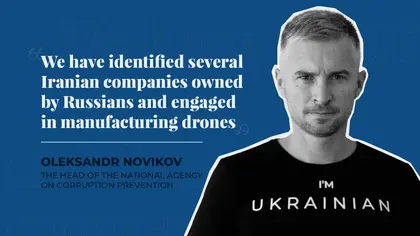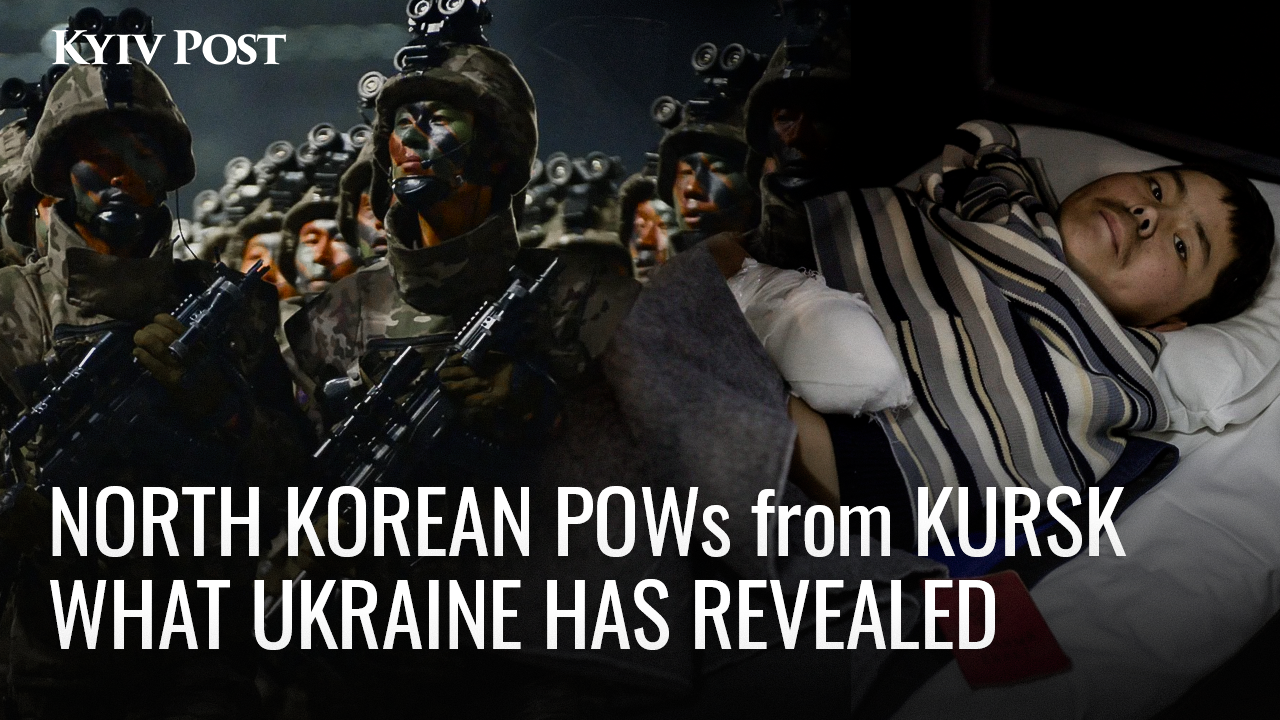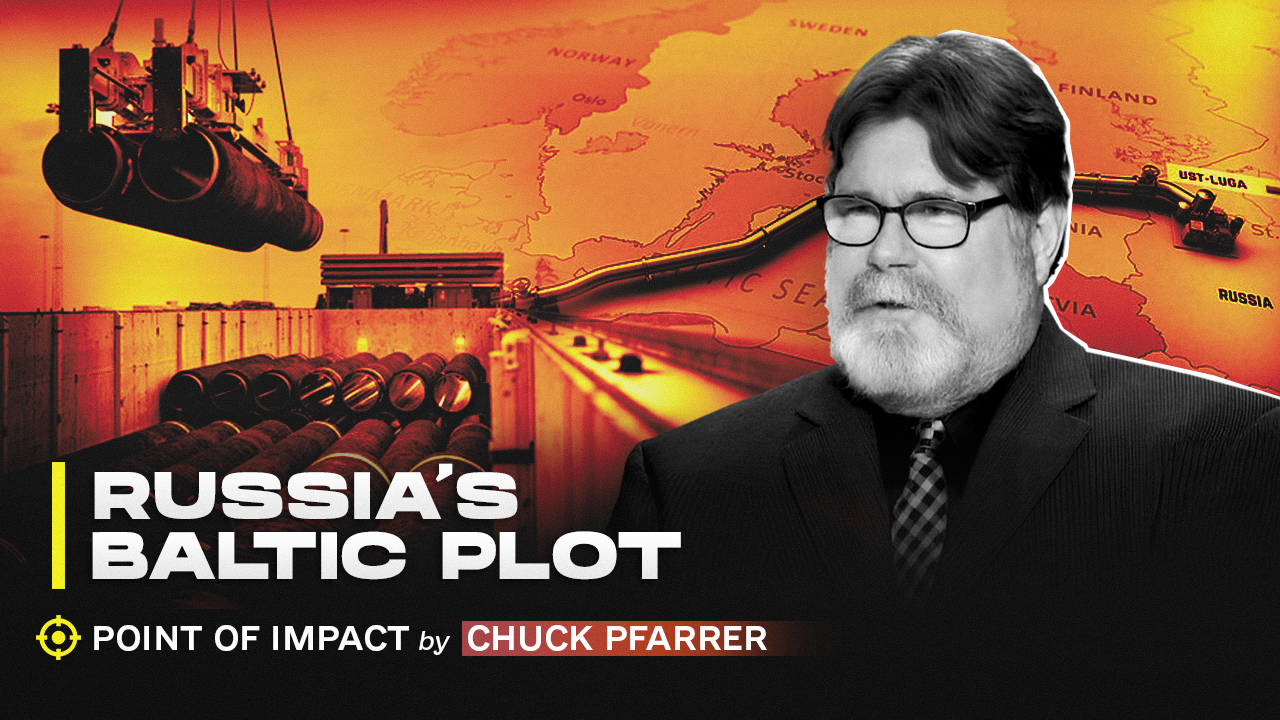Before Russia's full-scale invasion, the work of the National Agency for Prevention of Corruption (NAPC) consisted mostly of checking Ukrainian officials' asset declarations and their reported incomes relative to living standards – a simple and effective way to identify potentially corrupt public servants.
After Feb. 24, all NAPC public registers were made private to prevent data from being used by Russians and mandatory asset declarations were then suspended.
- Access the newest Ukraine news items published today.
- See the most recently published Ukraine news reports from today.
JOIN US ON TELEGRAM
Follow our coverage of the war on the @Kyivpost_official.
This led to a necessary shift in the focus of the organization’s work and today, instead of focusing mainly on Ukrainian officials, it now contributes to the government's sanctions policy, detecting Russians liable to national and international sanctions.
According to NAPC Head Oleksandr Novikov, its work is closely followed by nervous Russian oligarchs and some have even sent letters to the Agency claiming they do not support the Kremlin’s war against Ukraine and argue that sanctions imposed upon them are unfair.
In an interview with Kyiv Post, Novikov explains how the NAPC responds to such letters, its difficulties imposing sanctions, and whether the practice of mandatory asset declaration is likely to be resumed.
What's the situation now with corruption in Ukraine?
It's still there, though in new forms.
However, we are seeing huge public demand for honesty. Before the war, 40 percent of Ukrainians were against bribery in any situation. Now that number stands at 64 percent. This is a cardinal change.

Interview with KADORR Group CEO, Ruslan Kivan
Similarly, before the war, only 44 percent of citizens were prepared to report corruption cases. Today, that figure has shot up to 84 percent. Tremendous tectonic shifts have taken place in public opinion, and people want to live in a fair and honest society.
[Figures are taken from the latest survey conducted by the USAID].
Some acts of corruption are understood to be continuing under the cover of war. Can you give some examples?
I would point out two systemic issues. One is the suspension of mandatory asset declaration since the start of the war. We hope parliament will soon pass a bill to resume this practice. It's important, because without having to declare their various incomes, corrupt officials can conceal their assets.
Secondly, political parties are still not obliged to submit financial reports – a requirement that was suspended back in May 2020 due to the pandemic. Nobody still knows how they spend taxpayers' money. Almost one billion Hr. [$25 million] was earmarked for political parties in the 2023 national budget. So the practice of submitting financial reports needs to be back in place.
The number of corruption reports has decreased manifold.
We'll talk about asset declarations later. Our international partners keep demanding that we eradicate corruption. Do you think Ukraine can do that without constant reminders?
The fact that 84 percent of citizens are ready to report corruption indicates that the authorities will have to respond and work to eradicate corruption. Besides, after the Revolution of Dignity in 2014, elections were won by political parties that promised to meet public demand for restoring justice and defeating corruption.
President Volodymyr Zelensky’s program, as well as that of the ruling Servant of the People party, are heavily focused on anticorruption. Based on these and programs of other parties, the NAPC developed the Anticorruption Strategy, adopted by parliament this summer.
By Jan. 10, 2023, the government is to approve the State Anticorruption Program for the next three years. This document is supposed to change the country and ensure its compliance with European Union (EU) and NATO membership criteria.
Do you still receive reports of corruption?
The number of corruption reports has decreased manifold. This is due to both a decrease in corruption practice, combined with the fact that people don't have enough instruments of control over authorities and don't have full access to open data.
While mandatory asset declarations have been suspended, the NAPC is engaged in sanctions against Russians involved in the war. How are you involved in this and what are your tasks?
We continue to check asset declarations and we still monitor officials' ways of living. We have detected numerous cases of inaccurate declarations or unsubstantiated assets to the tune of about 400 million Hr. [$10.8 million].
As for sanctions, the Foreign Ministry asked us as Ukraine's biggest analytical body to identify persons involved in the war immediately after it began. On March 17, the NAPC sent the first package of identified persons' data, namely that of Russian oligarchs and their family members. Unfortunately, it was not until September that Ukraine imposed sanctions on them.
Then, at the president's initiative, the Yermak-McFaul Expert Group on Russian Sanctions was set up at the President's Office. Its sanctions roadmap designated the NAPC as the body tasked with identifying Russian individuals and legal entities involved in the war, making public their data and ensuring the provision of relevant materials to the foreign ministries of the U.S., U.K., EU nations, Japan and other countries.
All this information is available on our web portal War and Sanctions. Almost 5,000 individuals and legal entities are now under sanctions restrictions.
NAPC continues to check asset declarations and we still monitor officials' ways of living.
Besides Russians, do you also deal with Iranian individuals or companies that help Russia militarily?
The NAPC has a separate project titled Circumvention of Sanctions, and all government agencies provide it with information. For example, the Defense Ministry has provided information on the manufacturers of Iranian kamikaze drones.
We have prepared analytical materials for international partners within the sanctions group. Based on these, we submitted proposals to the National Security and Defense Council of Ukraine (NSDC) for imposition of sanctions, including on Iranian legal entities.
We have identified several Iranian companies owned by Russians and engaged in manufacturing drones and supplying them to Russia.
Do you know the total sum of Russian assets frozen under sanctions?
It should be around $1 trillion. By realistic estimates, it's closer to $350 billion.
On Dec. 23, Luxembourg and Belgium allowed Russians who are not under sanctions to withdraw part of their frozen assets until Jan. 7. In Luxembourg alone, as much as $100 billion is frozen.
You say the NAPC receives letters from Russian oligarchs who ask you to delete them from the sanctions list. How do you communicate?
Most of Russia's 20 richest men listed by Forbes have turned to us. We have received letters from David Yakobashvili, persons linked to Vladimir Lisin, and others.
Some of them are ready to recognize Russia as an aggressor state and Russian President Vladimir Putin as a war criminal in order to be excluded from sanctions lists. However, very little time is left for such acknowledgement to be sufficient for lifting sanctions. New legislation has been drafted in Ukraine that will criminalize any circumvention of sanctions. I hope it will take effect by February. The NAPC and journalists have recorded many cases of assets re-registered from oligarchs to their relatives or friends who are not under sanctions.
Some Russian oligarchs were lucky not to be sanctioned by the G7 group of nations. One of them, Lisin, tops the Forbes list of 20 richest Russians. Ukraine sanctioned him as the owner of the Novolipetsk metal works that supplies products to Russian defense enterprises and sells oil bypassing EU sanctions. Lisin is doing everything possible for the war to continue, and it's in the interest of democratic allies to limit this opportunity.
Why isn't Lisin under sanctions?
I have no explanation.
We regularly remind our international partners about him. Possibly, a part of his metal production is used by some of the coalition countries, but I'm sure Ukraine can replace this Russian produce.
It's important to bear in mind that if Ukrainian prosecutors don't bring criminal charges, that will allow the courts to confiscate Russian assets, then, after Ukraine wins the war, their assets will be unfrozen and they will get them back. Each and every case must be duly documented, and all legal procedures must be duly conducted.
Let me give you this example: ten months into the war, criminal charges have yet to be brought against Elvira Nabiullina, head of Russia's Central Bank and the central figure in bypassing sanctions and introducing the Russian financial system on the occupied territory of Ukraine. If we don't bring criminal charges against people like her, then we won't be able to get their assets confiscated in other countries.
Why doesn't Ukraine still have a separate sanctions agency?
We have proposed that the NAPC be mandated for this kind of activity until a new sanctions agency is established. David Arakhamia, leader of the Servant of the People party, tabled a relevant draft bill, but the Anticorruption Committee turned it down for unknown reasons. The draft bill also provided for resuming the practice of income declaration.
It takes additional funding to establish any new government agency, which Ukraine cannot afford because the lion's share of its finances goes to fund the army. So, it might take six to 12 months at best to establish a new sanctions agency.
Do you mean there is no resistance to establishing it on the part of the leadership?
There is resistance from individual subjects that don't want the government's sanctions policy to be effective.
How should confiscated Russian assets be transferred to Ukraine?
That's a political issue and the prerogative of the President's Office and central government.
I can only say that the Justice Ministry is drafting an international agreement that would provide for utilizing Russian assets for the benefit of Ukraine.
Some Russian oligarchs were lucky not to be sanctioned by the G7 group of nations.
You have recently claimed that Andriy Smirnov, deputy head of the President's Office, has blocked the sanctions process. He has responded in an interview. It looks like a personal conflict. What happened between you?
The NAPC communicates with all Ukrainian officials. I had a very good working relationship with Andriy Smirnov. I'd even say it was a friendly one.
After the NAPC initiated and co-authored a draft bill on amendments to the sanctions law, Smirnov and I stopped communicating. I don't know why. I think he's the only top official in this country who doesn't communicate with us.
Did he really block the imposition of sanctions?
Until Aug. 30, neither I, the NSDC nor other agencies authorized to identify persons liable to sanctions, knew the reasons why our international partners imposed more sanctions than Ukraine did.
On Aug. 30, during a meeting of the interagency working group, it became clear who and what slowed down the implementation of NSDC decisions.
The mandatory declaration of officials' incomes is still suspended. Why is that? And why is access to the Declarations Register restricted?
The Register is closed because Russians could use it to identify Ukrainian public servants and local self-government officials. That would put their lives in jeopardy. We know about some officials killed by Russians who found them through the Register.
Still, the asset declaration practice continues. Some 300,000 of 700,000 officials have already submitted declarations. So long as asset declaration remains non-mandatory, these citizens face unequal treatment, so it's necessary to make it mandatory again.
When can we expect that to happen?
We hope that parliament will resume this practice in January, but the Register will not be open until Ukraine wins the war.
Can you say for sure that this will happen, even after victory?
Open data access is one of the principles of Ukraine's Anticorruption Strategy. The law says that the Register shall be open.
This year, you appointed Artem Sytnyk, former director of the National Anticorruption Bureau (NABU), as your deputy. What are his responsibilities?
He is responsible for coordinating all the financial control divisions and the work of the conflict of interest department. After his appointment, our work with the NABU and the Specialized Anticorruption Prosecutor's Office (SAP) improved significantly. Sytnyk's main objective in the NAPC is to rule out corruption practices in public service.
The court ruled to include Sytnyk in the Register of Corrupt Officials administrated by the NAPC. Is his name still there and doesn't his appointment run counter to the Agency's anticorruption policy?
The Register still contains this information. The court ruling has been challenged at the European Court of Human Rights. In accordance with the Anticorruption Strategy adopted by parliament this year, a person can only be deprived of the right to occupy public positions if the court specifically rules so.
Was there pressure on you from higher offices after you appointed Sytnyk?
I know that the person who holds Ukraine back from pursuing victory at a faster pace, voiced concerns that the NAPC was "too independent" in its staff policy. But the law says that the NAPC is an independent institution and reports only to parliament.
You can also highlight the text and press Ctrl + Enter













